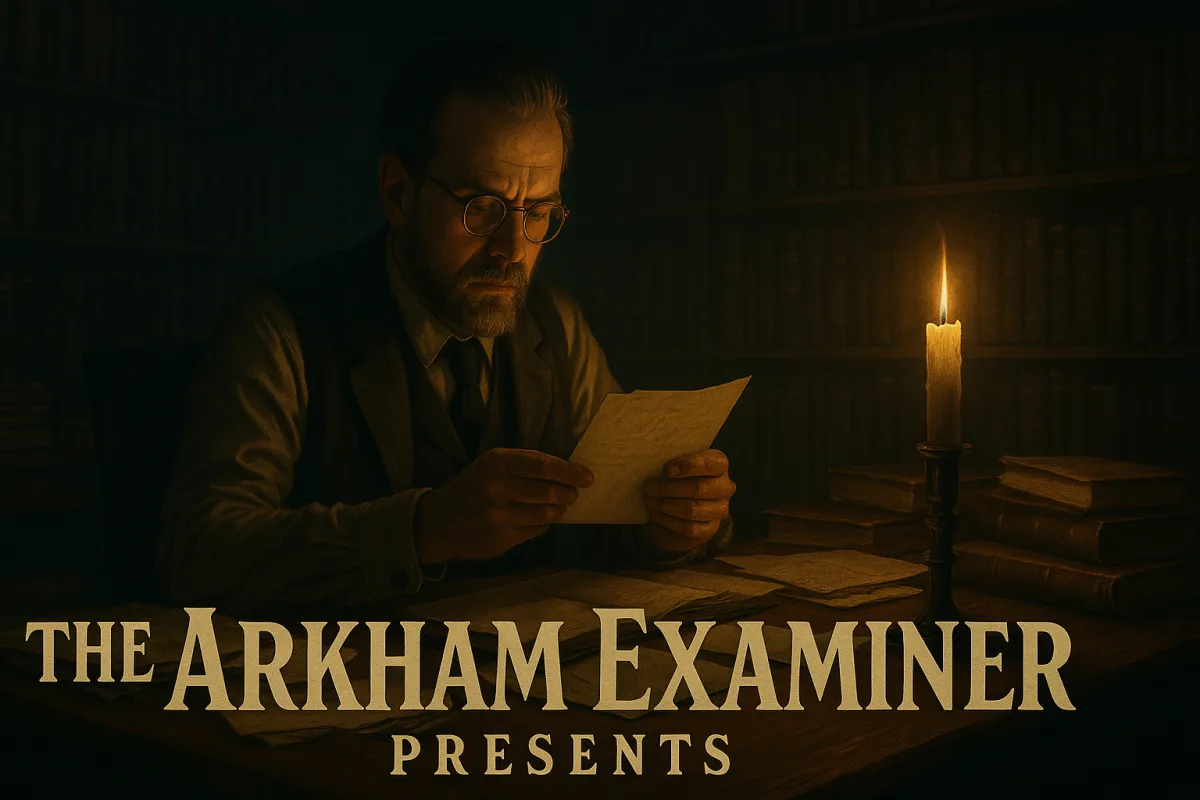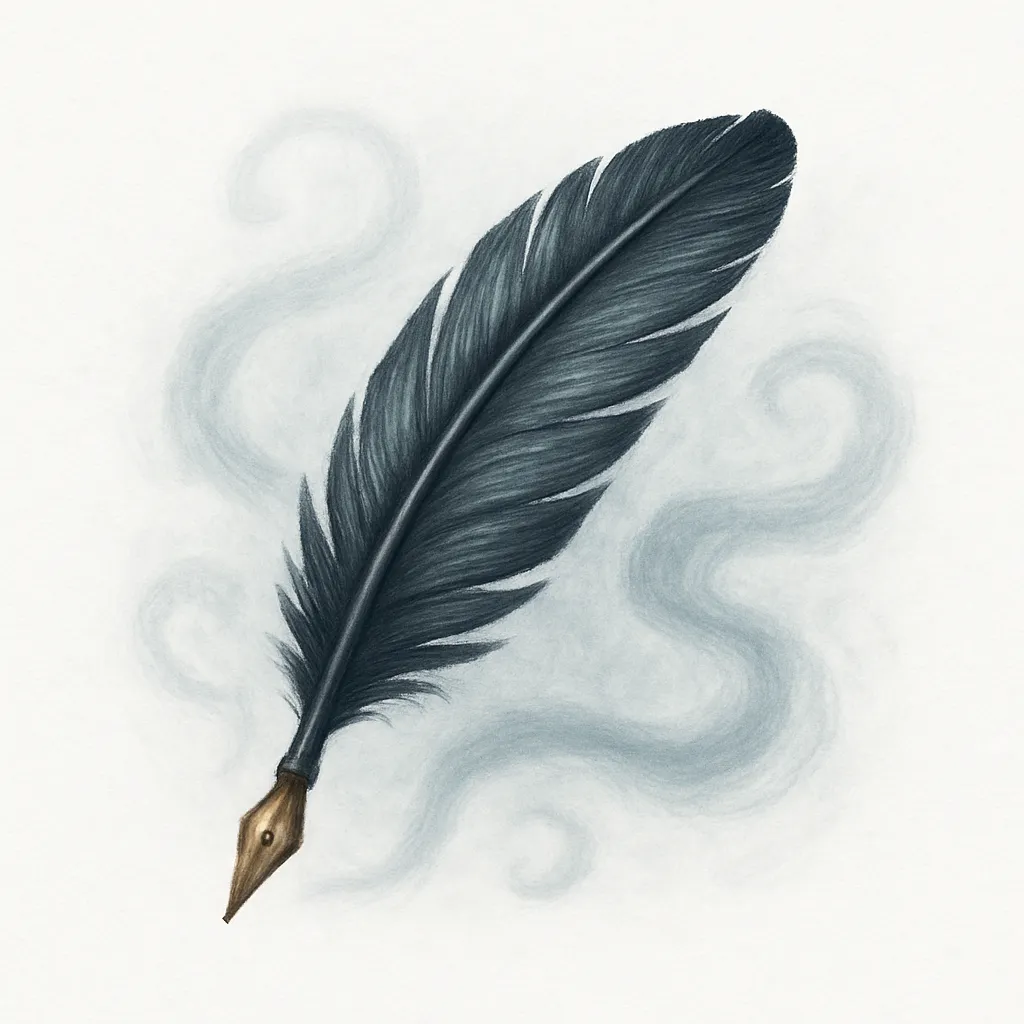The Arkham Examiner Archivist

The following excerpt was taken from the personal notes of Emory Holt, recovered shortly after the arrival of the Crowe journals.
Preface to “The Paranormal Investigations of Nathaniel Crowe”
by Emory Holt, Archivist of The Arkham Examiner
I make no claim to heroism. My hands have never shaken at the turn of a lock in some forgotten tomb. I’ve never stood eye to eye with things man was not meant to name. But I have read the journals. I have seen the ink. I have pored over the stains.
And that, dear reader, is burden enough.
For nearly a decade now, I have served as archivist for The Arkham Examiner, a position that once meant little more than sorting clippings, cataloging letters, and penning the occasional obituary when our staff was thin. Mine was a quiet existence. A contemplative one. I studied old cases and dusty folios, hoping to make sense of patterns long buried beneath bureaucracy or intentionally overlooked.
That changed the day I received a crate marked only with the sigil of Miskatonic University—an outdated crest, mind you, one that hadn’t been in use since the Great Fire of ’11. No return address. No sender’s name. Just a battered wooden box, sealed with pitch and bound in rusted wire.
Inside were journals. Dozens. Bound in cracked leather and vellum, some inked in Latin, others in Greek, and a few in languages I did not recognize. Interleaved among them were letters, sketches, faded photographs, and maps with hand-drawn annotations.
But it was the name scrawled on the inside cover of the first journal that stopped my breath: Nathaniel Crowe.
The Toll of the Task
Some nights, when the oil burns low and the wind slips beneath the panes of my study, I wonder whether these journals were meant to be found—or meant to remain buried. Their arrival was no accident. I am convinced now, more than ever, that someone—or something—wanted them read.
There are entries scrawled in haste, entire pages torn out and stuffed behind others. Several volumes had sigils etched into the leather bindings, scored in with what I first assumed to be rust but, under careful analysis, proved to be iron oxide—blood, perhaps, though aged beyond certainty. There are sketches that appear more hallucinated than drawn, filled with spirals, limbs, and architectural impossibilities. A few depict individuals with faces half-erased or strangely mirrored. One journal contained a feather sealed in wax. Another—hair.
I mention this not for sensation, but for context: Crowe’s work was not theoretical. He lived among the phenomena he chronicled, and it marked him. Sometimes physically. Always mentally.
The Quiet Custodian of a Hidden Archive
You may already be familiar with Mr. Crowe—at least in rumor. A brilliant, if eccentric, scholar of dead tongues and forgotten rites, once attached to the Department of Ancient Civilizations at Miskatonic. His fall from public life was as abrupt as it was final, punctuated by scandal, madness, and a trail of incidents that the university has since sealed behind locked doors and missing records.
What became of him afterward is the subject of these very chronicles.
As for how I came to be their keeper—I do not know who sent the crate. Only that it was meant for me. And that, once opened, I could not look away.
The journals were encoded, most written in Crowe’s personal cipher, a blend of syllabary, shorthand, and occult reference. It took me months to unlock the structure of the language. Years to piece together the chronology. Entire seasons were lost to trying to understand the context of certain references—places that do not exist on any map, individuals unrecorded by any census, phenomena that defy categorization even by fringe sciences.
But as I worked—alone, often by candlelight—I began to sense a thread. A rhythm. An unseen order spiraling inward, like the pattern of a shell or the rings inside a felled tree. And I understood: these were not diary entries. They were not case files, not in the traditional sense.
They were warnings.
Warnings Between the Lines
I have come to believe the journals are encoded not merely in language, but in intent. Crowe layered his entries like a man attempting to preserve truth under the weight of madness. Some pages contradict others, not out of error, but design. There are days when I am certain he intended his archive to be read by someone long after his disappearance—but only someone who knew how to look beneath the obvious.
In one entry, he describes an incident involving a series of repeating dreams tied to a particular sigil found in Kingsport. Two journals later, buried in a footnote, he corrects the symbol’s orientation with no additional comment—an adjustment that completely alters its meaning. This is not uncommon. Crowe left traps in the text, or perhaps tests. I have triggered a few. I no longer dream peacefully.
And yet, I continue.
Because if I do not do this work—who will?
On the Act of Translation
Much of what I present to you now is a reconstruction. These are not verbatim transcriptions of the journals—many of which remain too fragmented or esoteric to publish in their original form. Instead, I have undertaken the task of assembling the events described into something akin to a narrative, to help you, the reader, navigate what would otherwise be sheer madness.
But know this: nothing is embellished. Nothing is fictionalized. Every horror recounted, every shadow glimpsed, every whisper from beneath the floorboards—I have seen them etched in Crowe’s hand, over and over, across pages dark with age and trembling ink.
Some chronicles contain drawings, crude but disturbing. Others include transcriptions of audio logs I suspect were transferred from wax cylinders—Crowe was, after all, meticulous. When possible, I include these within the published volumes, alongside maps, sigils, and photos from locations that, in many cases, have since been lost to fire, flood, or institutional redaction.
I do not publish these accounts lightly. Each time I finish one, I place it in a sealed folio and pray it does not move on its own overnight.
A Chronicle’s Journey
Each chronicle I prepare is the result of dozens of cross-referenced sources: Crowe’s original ciphered notes, newspaper clippings long since pulled from public archive, university records redacted in ink and fire, even letters from surviving clients too frightened to speak openly. Some are reluctant to reply. Others respond only once, and in haste. I treat each word they send as a thread in a fragile web.
Before a chronicle reaches your hands, it has passed through multiple layers of review—if not editorial, then spiritual. I have taken to scribing protective symbols in the margins of my own working copies, not out of superstition, but survival. Several times I’ve found the same word repeated on pages where it did not previously appear. Once, my own name.
Even now, certain investigations remain incomplete. Not for lack of material, but because what I’ve translated cannot yet be contextualized. Some incidents Crowe recorded—especially those involving Innsmouth—refer to locations that no longer exist, or perhaps never did in the way we understand place and time. I withhold those accounts until I can be certain of their structural coherence—and of my own safety.
An Invitation to Bear Witness
What you hold in your hands, or read on your screen, is not entertainment. It is a ledger. A record of one man’s descent into realms unspoken, and the echoes his work has left in our world. I take no liberties in rendering Crowe’s accounts. I add no flourish. If I describe something as unspeakable, it is because the original page was soaked in water, salt, and ink—and that was all it said.
If these accounts unsettle you, then you are reading them correctly.
I offer them not as prophecy, but as precaution. Each chronicle is assembled for clarity, yes—but also as a ward, a beacon for those who may one day find themselves drawn into the same long shadows that followed Crowe from Arkham to Dunwich, from Kingsport to places far older than man.
If you're reading this, you’ve already crossed the threshold.
You are not alone.
A Word to the Curious
Many ask me: Why continue? Why not lock it away, or burn it?
Because truth must be preserved. Because these stories—dark as they are—contain knowledge. Because someone, someday, may need what Crowe discovered in order to survive what’s coming.
And because I have seen enough to know that some things find you whether you believe in them or not.
So I offer these chronicles to you—faithfully, monthly, completely intact—not as a literary curiosity, but as a matter of record. Each chronicle is a glimpse into a world most dare not see, reconstructed from the journals of a man who went too far, and written by the only one left willing to follow where he walked.
I remain,
Your devoted archivist and witness,
—Emory Holt, Archivist, The Arkham Examiner
